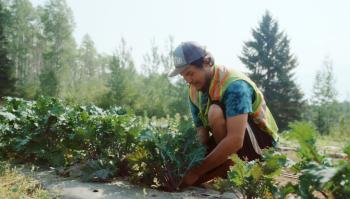Image Caption
Local Journalism Initiative Reporter
Windspeaker.com
Update
Tea Creek will be available to audiences across Canada on CBC Gem on Oct. 11th. The film will also screen at the Planet in Focus Film Festival in Toronto on Oct. 19th and at the Windsor International Film Festival on Oct. 28 and Nov. 1. Community screenings in B.C. will be on Oct. 9 in Hazelton and Oct. 10 in Terrace.
Original Story
Ryan Dickie was keen to be involved with his latest film because he believes there is an important message that needs to get out.
Dickie, a member of Fort Nelson First Nation in British Columbia, wrote and directed Tea Creek, a documentary about an Indigenous food sovereignty farm that had its premiere at the DOXA Documentary Film Festival on May 4 in Vancouver.
The film will have a second screening May 9 at the festival, presented annually by the non-profit organization called the Documentary Media Society.
Tea Creek features Indigenous food sovereignty activist Jacob Beaton. He transforms his family farm in the B.C. village of Kitwanga into Tea Creek, which includes a training centre for people whose mission it is to restore the food abundance Indigenous communities once had.
Dickie said Ben Cox, the producer of the film, had reached out three years ago with a few different Indigenous food sovereignty stories and said he was looking for an Indigenous director to help tell the story.
Dickie was more than willing to take on the Tea Creek project. He said he had noticed steep declines in Indigenous food networks in B.C., including with moose and caribou.
Dickie also said there is uncertainty over salmon stock and concern about deforestation, both of which has led to a drop in the availability of food for Indigenous communities.
“It’s an issue that’s been surfacing for quite a while,” Dickie said. “I haven’t really seen up until this point any concrete solutions of how to solve and get to food sovereignty on a larger scale.
“So that was really appealing seeing what Jacob and the team at Tea Creek are doing to not only create more abundance within their food network locally but also the impact it was having in the community on the participants that go to Tea Creek.”
The film includes details of how Tea Creek is transformative for some who have mental health challenges or are battling addictions.
“It has become a healing place,” Dickie said. “It has become a community within a community and it harkens us back to how things used to be. People eat together. They share. They tell stories together. They work together to solve problems. And that was really compelling for me growing up in community.”
Dickie, who is 39, is the child of a residential school survivor. His father, who died in 2015, had attended the Lower Post Residential School located near the B.C./Yukon border.
“So, I certainly grew up in that environment with generational trauma being a part of my life,” Dickie said.
Tea Creek is not entirely a feel-good story. The film includes details of the struggles, including financial ones, that Beaton encounters while trying to keep the Tea Creek farm open.
“We do touch on the funding challenges,” Dickie said. “But that was one of the biggest things I took home after the production, was the amount of support that is needed to get to the place that we want to get to as Indigenous people, to become food sovereign and sovereign in our own lives.
“And the support that is not quite there yet. That is one of the messages we wanted to get through that there are solutions for a better future for Indigenous communities and the individual, but the support is not quite there yet in some instances.”
Dickie said he’s hoping people with the right connections will be among those that see his film and that they respond with some sort of call to action.
“We need to be able to find solutions and we need to be able to adapt. And what Tea Creek is doing and what Jacob has done is really the right step forward,” Dickie said. “We’re hoping the right eyes get on this film and that they’ll be inspired to want to help and support in any way they can.”
Dickie is now hoping that Tea Creek will also be screened at some other film festivals in the near future. There are no confirmed screenings to announce yet.
But the film is expected to be shown on CBC and will be on the network’s streaming service CBC Gem at some point this summer.
Tickets for the second Tea Creek screening and other movies at the DOXA Documentary Film Festival, which runs until May 12, are available at https://www.doxafestival.ca/program
Local Journalism Initiative Reporters are supported by a financial contribution made by the Government of Canada.

